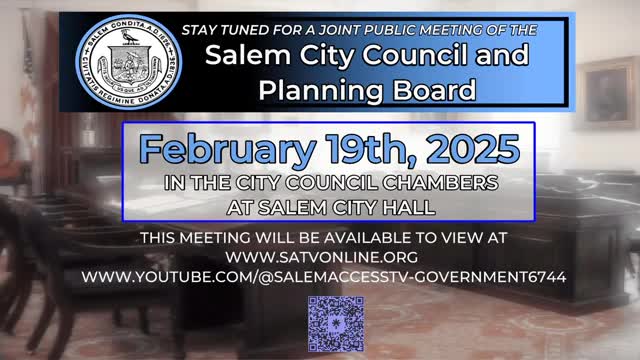Salem council holds public hearing on B1 zoning amendment to allow restaurants, indoor recreation
Get AI-powered insights, summaries, and transcripts
Subscribe
Summary
The Salem City Council held a joint public hearing Monday, Feb. 19, 2025, at 6:30 p.m. in City Hall Council Chambers on a proposed amendment to the zoning ordinance (Section 3.1) that would add restaurants serving alcohol and certain indoor commercial recreation uses to the Business Neighborhood (B1) use table.
The Salem City Council held a joint public hearing Monday, Feb. 19, 2025, at 6:30 p.m. in City Hall Council Chambers on a proposed amendment to the zoning ordinance (Section 3.1) that would add restaurants serving alcohol and certain indoor commercial recreation uses to the Business Neighborhood (B1) use table.
The amendment, introduced by Councilor Cohen, would change some B1 parcels from “not allowed” to uses requiring a special permit from the Zoning Board of Appeals, adding an additional review step beyond licensing and building permits. The council closed the public hearing and voted to refer the matter to the planning board for a written recommendation (the planning board’s response is due within 21 days).
Why it matters: the change would affect a small share of Salem commercial parcels but touches multiple neighborhoods — including Derby Street, Lafayette, Canal Street and other B1 districts — and raises questions about parking, noise, public safety, and the character of longtime residential neighborhoods. Supporters framed the amendment as a tool to create more walkable, neighborhood-level amenities; opponents said it risks increasing traffic, trash and late-night disturbances where homes and small businesses now coexist.
Council debate centered on trade-offs between neighborhood preservation and expanding business opportunities. Councilor Cohen, who presented the order to the council, said he reintroduced the matter after the ordinance’s calendar year lapsed and noted the planning board will review the proposal. "When something doesn't move forward, the calendar year has to expire," Councilor Cohen said, explaining why he brought the order back.
Councilor Gerizal described strong constituent opposition from Ward 1 and urged caution: "These zoning changes…should not be made overnight without extensive public input sessions," she said, citing concerns about parking, delivery trucks, noise and outdoor smoking near residences. Phil Laffey, a resident who testified, warned that the term "commercial recreation" is broad and could allow uses with substantial noise. Councilor Hobby echoed parking and public-safety concerns for residents in dense neighborhoods.
By contrast, Councilor Marcelo and Councilor Watson Felt spoke in favor of the amendment. Marcelo said "Overly restrictive zoning is what has created a lot of the problems that we have in Salem," arguing that existing B1 districts often grew up around businesses already operating in residential areas. Watson Felt said the proposed change would affect only about 2% of the city's commercial parcels and called it a step toward spreading amenities across neighborhoods to reduce driving.
Public comment showed a mix of views. Opponents from Derby Street and Lafayette voiced worries about more liquor-serving establishments and the cumulative effect on neighborhood streets. Tim Draper, a Derby Street resident, asked the council to "protect the residential quality of this unique historic area" and urged the council to vote against the proposed change for that neighborhood. Polly Wilbert cited parking shortages and said many B1 areas lack the customer base to sustain restaurants without drawing drivers from outside the neighborhood.
Supporters argued the change would increase neighborhood services and accessibility. Peggy Harrington, a long-time Derby Street resident, said Derby Street is "a well preserved, vibrant, walkable neighborhood" and called for more local markets and restaurants. Lydia King described walking 30 minutes to reach a restaurant that met dietary needs: "Having variety and choice all over Salem helps everyone," she said. Several speakers noted the change would not remove public review: projects would still require special permits and licensing hearings.
Procedural actions: the council voted to close the public hearing (motion by Councilor Cohen, seconded by Councilor Watson Felt) and to refer the amendment to the planning board for a recommendation; Chair Reeder and the planning board then closed their portion of the public hearing by roll call. Councilors and the planning board noted the zoning amendment requires a supermajority for final approval and that additional public hearings and licensing steps would follow if the ordinance changes move forward.
Next steps: the matter was referred to the Salem Planning Board for a written recommendation, which the council and Chair Reeder confirmed would be returned within 21 days. Any future project would still require applicable special permits, licensing board review and building permits.
Votes at a glance: the council closed the public hearing and referred the ordinance amendment to the planning board (motion carried; council voice vote). The planning board closed its public hearing portion by roll-call, with members recorded as voting yes.
(Reporting note: the hearing was held pursuant to Chapter 48, Section 5 of the Massachusetts General Laws, as announced at the start of the session.)
